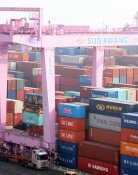2012 adds new chapter to country`s proud history
2012 adds new chapter to country`s proud history
Posted December. 31, 2012 10:47,
One day remains before the year 2012 ends. As people bid farewell to the year, some will feel proud, while others wish to forget it amid regret. Seen from the perspective of the entire population of 50 million, 2012 was a year that added a chapter to the great history of the Republic of Korea. The country saw its sovereign credit rating rise, achieved 1 trillion U.S. dollars in two-way trade, secured fifth place overall at the London Summer Olympics, and globalized the Korean Wave led by rapper Psy`s hit Gangnam Style. These comprise the proud legacy that demonstrates that the country has robustly made strides toward the world.
The general public underwent inconvenience and hardship through the general and presidential elections, which showed conflicts of generations, regions and the haves and have-nots. Elections nurture conflict but bring about changes. The Korean people elected Park Geun-hye, candidate of the ruling Saenuri Party, as their next president. The power structure at the National Assembly has been reshuffled in the form of the ruling partys leadership and the opposition`s strides. The public longs for change amid stability.
The popularity of Ahn Cheol-soo, a former IT guru who briefly ran for president before dropping out in late November, swayed politics throughout the year as the people sought "new politics." As a result, the 14-year-old Grand National Party renamed itself the Saenuri (New Frontier) Party. The main opposition Democratic United Party also struggled in twice undergoing leadership changes, but displayed its limitations by resorting more to political engineering such as a coalition of the opposition camp and unification of candidates rather than self-reform. The public handed down a stern judgment. The minor opposition Unified Progressive Party vividly showed its true colors, including its non-democratic nature and pro-North Korea stance through violence. Because of irregularities committed in its nomination of candidates for the general elections, the party was shunned by the public.
When Ahn, the Seoul National University dean-turned-politician, declared his candidacy, the presidential election shifted to a three-way race among ruling party candidate Park, the main opposition Democratic United Party candidate Moon Jae-in and Ahn. With Ahn dropping out of the race in late November, the race turned into a two-way competition between the ruling and main opposition parties. The "Ahn Cheol-soo syndrome" also subsided like a daydream on a spring day. Ahn`s style of politics ended in failure, but the two major parties should use the phenomenon as momentum for new politics.
The Korean public also showed strong desire for unity to counter conflict and hostility. Both Park and Moon pledged national integration in the course of the election campaign. They sought public support by expanding their respective supporters groups and fine-tuning their images, but their genuine intent to alleviate severe social conflict cannot be ruled out.
If 1987 was the first year of the country`s political democratization, 2012 can go down as Korea`s first year of economic democratization. Election pledges on welfare programs were made en masse, and more people raised voices urging leaders to beef up regulations to tame the economy of greed, which hampers sound market order and fair competition. But excessively harsh attacks on conglomerates are feared to dampen economic vitality and growth potential. Whether it is welfare or economic democratization, things in excess are no better than a shortage.
The people have pinned their hopes on President-elect Park, who pledged to become a president who achieves public unity and revives the peoples livelihood. Koreans are invited to dream of new hope for the New Year as they hear ringing of the Watch-Night bell together with family and friends to welcome 2013. Adieu 2012!







